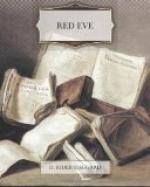Now, noting this disturbance, the King spoke to the youth at his side, who came forward and said, in a pleasant, courteous voice, addressing Hugh:
“Sir, why do you make trouble in these streets, and tumble the good Sir Ambrose Lacey from his horse with such scant ceremony?”
“Sir,” answered Hugh, “because the good Sir Ambrose tried to ride his horse over me for no offence save that I would deliver a message to his Grace, which he will wish to hear.”
“This is scarcely a time for the giving of messages,” replied the young man, “but what is your name, and who sends the message? I am the Prince Edward,” he added modestly, “so you may speak to me without fear.”
“My name is Hugh de Cressi, your Highness, and I am sent by the Reverend Father Sir Andrew Arnold, of Dunwich, and have followed his Grace from Westminster, whither I and my men rode first.”
Now, the Prince went to the King and spoke to him, and, returning presently, said:
“My father says that he knows both the names you give well enough and holds them dear. He bids that you and your people should follow him to the castle, where you will be entertained, with your horses. Sir Ambrose,” he added, “the King desires that you should forget your choler, since he saw what passed, and deems that this young stranger did well to check your horse. Follow on, Hugh de Cressi, the officers will show you where you and your men may lodge.”
So Hugh obeyed, and rode with the rest of the train and his folks through the gates of Windsor Castle. Nor did they do so unobserved, since many of the Court had no love for Sir Ambrose, and were glad to see him tumbled in the mire.
After they had stabled their beasts, as Hugh, followed by Grey Dick, was advancing toward a hall which he was told that he might enter, an officer came up.
“His Grace desires your presence before you sup,” he said.
Pointing to Grey Dick, at whom the officer looked doubtfully, Hugh asked that he might accompany him, as he had much to do with the message. After some argument they were led through various passages to a chamber, at the door of which the officer wished to take away Dick’s bow. But he would not give it up.
“The bow and I do not part,” he said, in his croaking voice, “for we are husband and wife, and live and sleep together as the married should.”
As Dick spoke the door was opened, and Prince Edward appeared.
“And do you eat together also, good fellow?” he asked, having overheard the talk.
“Ay, sir, we feed full together,” replied Dick grimly; “or so thought some on Blythburgh Marsh a few days gone.”
“I should like to hear that tale,” said the Prince. “Meanwhile, since both my father and I love archers, let him pass with his bow. Only keep his arrows lest it should happen to grow hungry here.”
Then they entered the chamber, led by the Prince. It was a fine place, with a vaulted stone roof and windows of coloured glass, that looked like the chancel of a church. Only at the head of it, where the altar should have been, was a kind of dais. On this dais were set some high-backed oaken chairs with many lanterns behind them in which burned tapers that, together with a great wood fire, gave light to the chamber.




